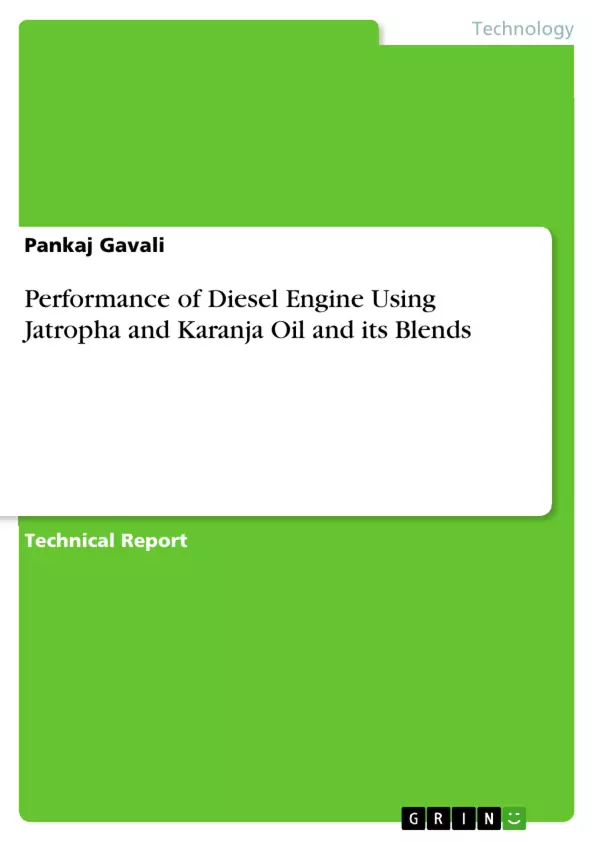Biomass derived vegetable oils are quite promising alternative fuels for agricultural diesel engines. Use of vegetable oils in diesel engines leads to slightly inferior performance and higher smoke emissions due to their high viscosity. The performance of vegetable oils can be improved by modifying them through the transesterification process. In the present work, the performance of single cylinder water-cooled diesel engine using methyl-ester of Jatropha and Karanja oil as fuel was evaluated for its performance and exhaust emissions.
The fuel properties of biodiesel such as kinematic viscosity, calorific value, flash point, carbon residue and specific gravity were found. Results indicated that B25 has closer performance to diesel and B100 has lower brake thermal efficiency, mainly due to its high viscosity compared to diesel. The brake thermal efficiency for biodiesel and its blends was found to be slightly higher than that of diesel fuel at tested load conditions and there was no difference between the biodiesel and its blended fuels efficiencies. For Jatropha and karanja biodiesel and its blended fuels, the exhaust gas temperature increased with increase in power and amount of biodiesel. But, diesel blends showed reasonable efficiency, lower smoke, CO2, CO and HC.
Inhaltsverzeichnis (Table of Contents)
- Introduction
- India's Energy Scenario
- Need for alternative fuel
- Types of alternative fuels
- History of bio-diesel
- Why to use biodiesel
- Advantages
- Disadvantages
- Problem of definition
- Literature Review
- Preamble
- Jatropha as a Biodiesel
- Karanja as a Biodiesel
- Mixture of karanja and Jatropha as a biodiesel
- Effect of Biodiesel on Engine Emission
- Theory
- Biodiesel
- Filtering
- Removing the Water
- Catalytic Reaction
- Acid Catalyst Reaction
- Base catalyzed reaction
- Biodiesel
- Experimental test rig and test process
- Engine specifications
- Engine test process
- Formulae
- Observations
- Results and Discussions
- Performance of engine
- Exhaust Emission Results
- Graphs
- Conclusion
Zielsetzung und Themenschwerpunkte (Objectives and Key Themes)
This research investigates the feasibility of using methyl-ester of Jatropha and karanja oil as alternative fuels for a single cylinder water-cooled diesel engine. The study aims to assess the performance and exhaust emissions of the engine when using these biodiesels. It explores the properties of the biodiesel fuels, including kinematic viscosity, calorific value, flash point, carbon residue and specific gravity. The research analyzes the effects of various blends of biodiesel on engine performance and emissions, comparing them to traditional diesel fuel.
- Exploring the potential of Jatropha and karanja oil as alternative fuels for diesel engines.
- Assessing the performance and emissions of the engine using biodiesel blends.
- Comparing the properties of biodiesel fuels to conventional diesel.
- Analyzing the impact of biodiesel blends on engine efficiency and emissions.
- Evaluating the viability of biodiesel as a sustainable and environmentally friendly fuel option.
Zusammenfassung der Kapitel (Chapter Summaries)
- Introduction: This chapter provides an overview of India's energy scenario, highlighting the growing demand for energy and dependence on imported crude oil. It emphasizes the need for alternative fuels and introduces the concept of biodiesel as a viable option.
- Problem of definition: This chapter discusses the challenges in defining and standardizing biodiesel, outlining the different types and properties of biodiesel fuels.
- Literature Review: This chapter presents a comprehensive review of existing research on the use of Jatropha and karanja oil as biodiesel fuels. It explores their potential as alternative fuels, examining their advantages and disadvantages.
- Theory: This chapter delves into the theoretical aspects of biodiesel production, including the transesterification process and the effects of different catalysts.
- Experimental test rig and test process: This chapter describes the experimental setup used to evaluate the performance and emissions of the engine using biodiesel blends. It outlines the engine specifications, the test process, and the formulas used for data analysis.
- Observations: This chapter presents the detailed observations collected during the engine tests using different biodiesel blends. It provides data on engine performance and emissions.
- Results and Discussions: This chapter analyzes the experimental results, examining the impact of biodiesel blends on engine performance and exhaust emissions. It compares the results with those obtained using conventional diesel fuel.
Schlüsselwörter (Keywords)
The study focuses on key terms and concepts related to alternative fuels, biodiesel, engine performance, emissions, and the use of Jatropha and karanja oil as sustainable fuel sources. It investigates the potential of biodiesel as a replacement for conventional diesel fuel, analyzing its impact on engine efficiency and environmental factors.
Frequently Asked Questions
What are Jatropha and Karanja oils?
They are biomass-derived vegetable oils that serve as promising alternative fuels for diesel engines, particularly in agricultural settings.
What is the "transesterification process"?
It is a chemical process used to modify vegetable oils to reduce their high viscosity, making them more suitable for use in standard diesel engines.
How does the performance of B25 blend compare to diesel?
The research indicates that the B25 blend (25% biodiesel) has performance characteristics very close to those of traditional diesel fuel.
What are the environmental benefits of using biodiesel blends?
Diesel blends using Jatropha or Karanja showed lower emissions of smoke, CO2, Carbon Monoxide (CO), and Hydrocarbons (HC).
Why does B100 have a lower thermal efficiency?
B100 (pure biodiesel) has lower brake thermal efficiency primarily due to its higher kinematic viscosity compared to conventional diesel.
Does exhaust gas temperature change with biodiesel use?
Yes; for both Jatropha and Karanja, the exhaust gas temperature increased as the power load and the percentage of biodiesel in the fuel increased.
- Quote paper
- Pankaj Gavali (Author), 2022, Performance of Diesel Engine Using Jatropha and Karanja Oil and its Blends, Munich, GRIN Verlag, https://www.grin.com/document/1184798



